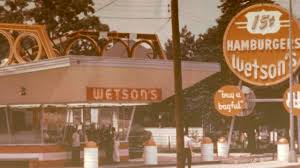
In my piece yesterday about working at McDonald’s as a teenager, I mentioned that we didn’t put mustard on the hamburgers (just ketchup, pickles, and onions) because no one on Long Island wanted that condiment. After reading it, Craig Wiener emailed:
It wasn’t just Long Island McDonald’s that had the no mustard policy, I think it was all McDonald’s in the tri-state area (though we were more likely to frequent Wetson’s since there wasn’t a McDonald’s nearby in our part of Northern NJ). I have this distinct memory of stopping at a McDonald’s in PA on a family road trip and being utterly disgusted when I bit into a burger and found it had mustard on it.
First of all, just seeing the word Wetson’s makes my mouth water. It was the first — and for a long time, only — fast food place in my hometown, Roslyn. My brother and I considered it a major victory every time we convinced our father to take us there for dinner.
Wetson’s had no indoor seating nor a drive-thru. You parked near the “Buy A Bagful!” sign, walked up to the exterior window, ordered your 15-cent burgers and 10-cent fries, then waited less than a minute for your order to be stuffed in a bag and handed to you.
I recall two cement tables and benches in front of the store, but we always ate the food in our car. I still remember my father’s 5-cent cup of coffee steaming up the driver’s side of the windshield while Seth and I sucked down milkshakes that couldn’t have cost more than a quarter. I’m sure if I tried the same items now, they wouldn’t be nearly as good as they are in my memory, but at the time, they tasted wonderful to my young mouth.
Wetson’s had several dozen outlets in the New York area which thrived during the 1960s, but once McDonald’s and Burger King franchises moved in, they become too much for the small regional chain to compete with. The last Wetson’s closed in 1975.
As for the mustard, Craig is right about it not being served on hamburgers throughout the tri-state area (NY, NJ, CT). I don’t remember how far that taste preference reached geographically, but I remember stopping at a McDonald’s on a family road trip to Lake George in upstate New York and having exactly the same reaction when I found mustard on my burger. Yuck! Even to this day, I blanch at the very thought.
Regarding the other part of my McDonald’s story — about slipping on the greasy floor, falling onto the grill, and burning one of my hands pretty badly — Craig continued:
Sounds like your injury would have been covered by worker’s compensation (described on one of the many employee bulletin board posters a young college student would be sure to ignore). Not only would it have covered the cost of treating your injury but might have also paid you for the time you had to miss due to your injury.
He’s absolutely correct that, as a teen, I had no idea there was such a thing as worker’s compensation. Nobody mentioned it to me during the less-than-one-hour training session I attended after being hired. That consisted almost entirely of sitting in the restaurant’s basement watching videos which explained how to pour frozen french fries into a vat of hot oil and turn frozen meat patties into edible hamburgers by searing them on the grill. When those meager instructions ended, I was given a McDonald’s uniform shirt and paper hat to wear and put to work.
I bet the new-hire experience hasn’t changed much in the intervening five decades. I doubt modern-day fast-food employees learn about worker’s comp or any of their other “human resources” benefits, either. But since the franchisee covered the hospital expenses related to my seared flesh, I didn’t give it another thought.
At least no one tried to soothe the pain by applying mustard to my hand.
